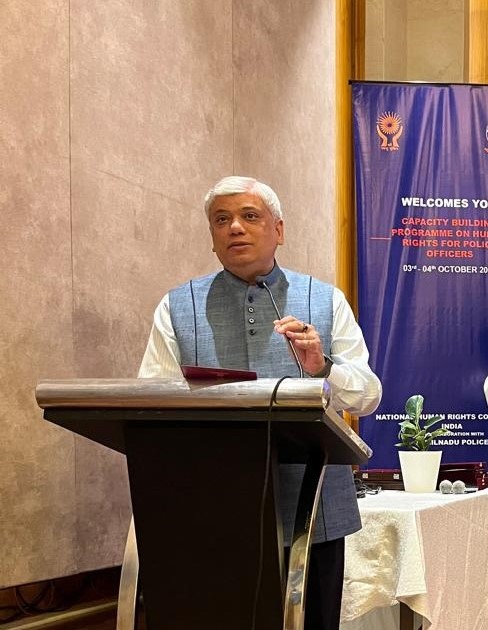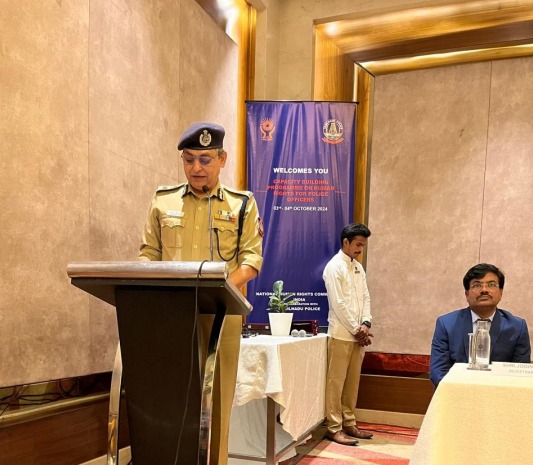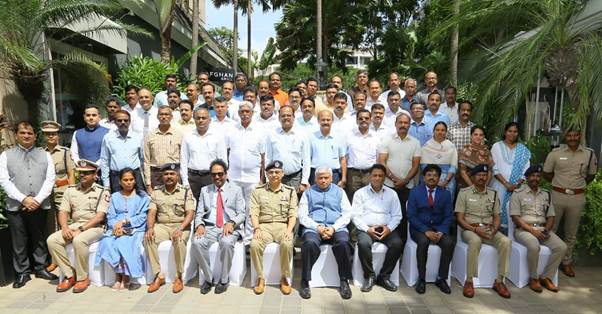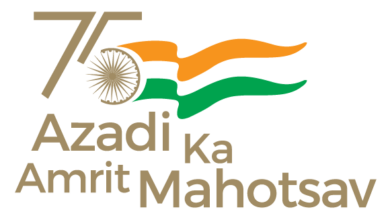NHRC’s two-day residential capacity- building programme on human rights organized in collaboration with Tamil Nadu Police concludes

The National Human Rights Commission (NHRC), India has been organizing human rights awareness programmes for sensitization of All India Services officers including IAS, IPS, and IFS officers. In the series of such programmes, the Commission organized a two-day residential capacity-building programme for Tamil Nadu and Karnataka police officers in Coimbatore from 3rd-4th October, 2024. It was organized in collaboration with Tamil Nadu Police. In addition to the inaugural and valedictory sessions, the programme had seven technical sessions on various aspects of human rights and policing. About 45 police personnel including Additional Superintendents of Police (Addl. SP), Superintendents of Police (SP) and Deputy Inspectors General (DIG) rank attended. On 3rd October, 2024, NHRC, India DG (I), Shri Ajay Bhatnagar inaugurated it in the presence of Shri Shankar Jiwal, Director General of Police, Tamil Nadu, Shri Devajyoti Roy, Additional Director General, Karnataka and Shri Joginder Singh, Registrar (Law), NHRC. He said that the concept of preventive actions by the states should preside over punitive actions. The idea should percolate to every aspect of policing. Shri Shankar Jiwal, DGP, Tamil Nadu, praised the innovative concept of conducting capacity-building training at the zonal level in Coimbatore and expressed gratitude to the NHRC for organizing such a flagship training program. In the first session on the ‘Human Rights and Ethical Dilemmas – A Practitioner’s Perspective,’ Shri Ajay Bhatnagar highlighted the challenges officers encounter while balancing their responsibilities in upholding human rights within the framework of law enforcement. In the second session, Justice Shri V. Kannadasan, Member, Tamil Nadu State Human Rights Commission spoke about the ‘Human Rights and the Role of Police Officers’. He highlighted issues including false complaints and the importance of judicial activism in ensuring justice. Shri Joginder Singh, Registrar (Law), NHRC spoke in the third session on ‘Various Guidelines issued by the NHRC relating to Policing and Important Supreme Court Cases’. He highlighted the key areas where the Commission has issued directions to improve police practices, with a particular emphasis on human rights violations during investigations, custodial violence, and the need for transparency and accountability in law enforcement. Shri Devajyoti Ray, Additional Director General of Police, Karnataka, spoke on the ‘Infrastructure of Human Rights Complaints Redressing System in Karnataka’ in the fourth session of the first day. He gave an insight into the Karnataka State Human Rights Commission's (KSHRC’s) innovative approach to complaint registration, which includes both an app-based system and a web-based platform, making it easier for citizens to report violations. On Day 2, NHRC, India Secretary General, Shri Bharat Lal spoke in the first session about the ‘Evolution of Human Rights Framework’ He emphasized that greatness is all about prioritizing others' welfare and highlighted the police's crucial role in delivering justice and upholding the human rights of all and particularly those who are most vulnerable. He cited examples from Lord Buddha and other Indians like Mahatma Gandhi, Dr. Ambedkar, Dr. Karve, Raja Ram Mohan Roy, and so many freedom fighters and social reformers who devoted their whole life for the wellbeing of others. Nelson Mandela, Martin Luthar King Jr. and many other civil rights activists worked as human rights defenders. Secretary General Shri Bharat Lal appealed the police officers to be the true human rights defender. Shri Rajiv Jain, former Member NHRC delivered a lecture in the second session on ‘Jurisprudence on Human Rights. He emphasized the importance of protecting fundamental rights as in Article 21 of the Constitution and referenced landmark Supreme Court cases, including Sunil Batra and Maneka Gandhi in this regard. He discussed justice access, female prisoners' rights, and state liability. He highlighted the critical role of judiciary in safeguarding human rights. The last session was addressed by Shri Joginder Singh, Registrar (Law), on the ‘Cases of Human Rights Violations Registered at NHRC in Connection with Tamil Nadu.’ **** NSK/VCK The National Human Rights Commission (NHRC), India has been organizing human rights awareness programmes for sensitization of All India Services officers including IAS, IPS, and IFS officers. In the series of such programmes, the Commission organized a two-day residential capacity-building programme for Tamil Nadu and Karnataka police officers in Coimbatore from 3rd-4th October, 2024. It was organized in collaboration with Tamil Nadu Police. In addition to the inaugural and valedictory sessions, the programme had seven technical sessions on various aspects of human rights and policing. About 45 police personnel including Additional Superintendents of Police (Addl. SP), Superintendents of Police (SP) and Deputy Inspectors General (DIG) rank attended. On 3rd October, 2024, NHRC, India DG (I), Shri Ajay Bhatnagar inaugurated it in the presence of Shri Shankar Jiwal, Director General of Police, Tamil Nadu, Shri Devajyoti Roy, Additional Director General, Karnataka and Shri Joginder Singh, Registrar (Law), NHRC. He said that the concept of preventive actions by the states should preside over punitive actions. The idea should percolate to every aspect of policing. Shri Shankar Jiwal, DGP, Tamil Nadu, praised the innovative concept of conducting capacity-building training at the zonal level in Coimbatore and expressed gratitude to the NHRC for organizing such a flagship training program. In the first session on the ‘Human Rights and Ethical Dilemmas – A Practitioner’s Perspective,’ Shri Ajay Bhatnagar highlighted the challenges officers encounter while balancing their responsibilities in upholding human rights within the framework of law enforcement. In the second session, Justice Shri V. Kannadasan, Member, Tamil Nadu State Human Rights Commission spoke about the ‘Human Rights and the Role of Police Officers’. He highlighted issues including false complaints and the importance of judicial activism in ensuring justice. Shri Joginder Singh, Registrar (Law), NHRC spoke in the third session on ‘Various Guidelines issued by the NHRC relating to Policing and Important Supreme Court Cases’. He highlighted the key areas where the Commission has issued directions to improve police practices, with a particular emphasis on human rights violations during investigations, custodial violence, and the need for transparency and accountability in law enforcement. Shri Devajyoti Ray, Additional Director General of Police, Karnataka, spoke on the ‘Infrastructure of Human Rights Complaints Redressing System in Karnataka’ in the fourth session of the first day. He gave an insight into the Karnataka State Human Rights Commission's (KSHRC’s) innovative approach to complaint registration, which includes both an app-based system and a web-based platform, making it easier for citizens to report violations. On Day 2, NHRC, India Secretary General, Shri Bharat Lal spoke in the first session about the ‘Evolution of Human Rights Framework’ He emphasized that greatness is all about prioritizing others' welfare and highlighted the police's crucial role in delivering justice and upholding the human rights of all and particularly those who are most vulnerable. He cited examples from Lord Buddha and other Indians like Mahatma Gandhi, Dr. Ambedkar, Dr. Karve, Raja Ram Mohan Roy, and so many freedom fighters and social reformers who devoted their whole life for the wellbeing of others. Nelson Mandela, Martin Luthar King Jr. and many other civil rights activists worked as human rights defenders. Secretary General Shri Bharat Lal appealed the police officers to be the true human rights defender. Shri Rajiv Jain, former Member NHRC delivered a lecture in the second session on ‘Jurisprudence on Human Rights. He emphasized the importance of protecting fundamental rights as in Article 21 of the Constitution and referenced landmark Supreme Court cases, including Sunil Batra and Maneka Gandhi in this regard. He discussed justice access, female prisoners' rights, and state liability. He highlighted the critical role of judiciary in safeguarding human rights. The last session was addressed by Shri Joginder Singh, Registrar (Law), on the ‘Cases of Human Rights Violations Registered at NHRC in Connection with Tamil Nadu.’ **** NSK/VCK


























